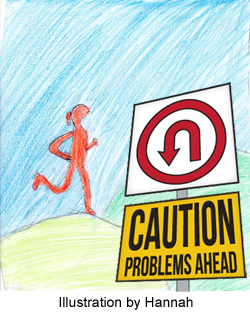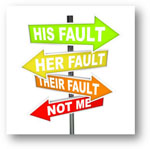 In my post last week, I listed some of the ways we run from our problems. Did you recognize yourself in some of them? The big question is: Why do we run? Wouldn’t it be easier to go ahead and find a solution rather than continue on down the road of defeat and misery?
In my post last week, I listed some of the ways we run from our problems. Did you recognize yourself in some of them? The big question is: Why do we run? Wouldn’t it be easier to go ahead and find a solution rather than continue on down the road of defeat and misery?
I am sure you would quickly say “yes”, but —. The truth of the matter is most of us have “preconceived ideas” as to why we should not deal with our problems.
To cite a few examples:
1. Some people think their situations are normal.
Many people have seen so much loneliness, pain, and hurt in their families’ lives for years, and have come to believe that this is the way life is supposed to be. This is simply not true.
My close friend, Gail, had grown up in a home where she saw drugs, alcohol, and physical abuse, on a daily basis. Two of her immediate family members were murdered while involved in a card game. As the oldest of 5 children, Gail had to assume the role of “care taker.” She recalls many times during violet outbursts between her parents, that she would have to lead the younger children to a safe hiding place underneath the house.
However, Gail sensed that not all families lived this way, so she sought out good friends at school, visited with them in their homes, and went to church with them. When Gail married, she raised her children in a Christian home. The cycle was broken!
The Bible tells us we shouldn’t eat the sour grapes of our fathers (Ezek. 18: 2-3). Gail, made a choice to stop eating the sour grapes and “rise above the norm.”
2. Some people think “good Christians” shouldn’t have problems.
Laura was one who thought that if she confessed she was having problems around her unsaved loved ones, that it would make God look bad. “I’m supposed to be a witness to my unsaved loved ones; I can’t let them know I have problems!”
The Bible says “In this world ye shall have tribulation, but of good cheer; I have overcome the world” (John 16:33). Being a Christian doesn’t exempt us from problems; it does, however, give us an anchor in Jesus.
3. A Learned Response in Childhood
Sometimes as children, we are taught that “big boys and girls don’t cry.” This teaches us to suppress our pain, and this response learned in childhood carries over into adulthood.
4. The Need to Control
The need to control carries with it the feeling that says, “I can and will direct my life, and even your life, too, if you get in my way.” Some people in this category possibly have been hurt in the past, so they set out to control everybody in order not to be hurt again. Others in this group are perfectionists, having no flexibility, and who uses both subtle and strong manipulative ways of controlling others to meet their need.
Faith and her daughter were in counseling for family relationship problems that had gone on for years. Faith’s daughter was at last breaking from the manipulative control that Faith had had on her. As Faith saw this control being broken, she threatened suicide and went into a deep depression. The counselor’s diagnosis was: “Out of Faith’s need to control, she had now lost control of her own life.”
5. Some people think that their problem will evaporate and fade away into thin air.
This explains me better than any of the other reasons. God used my dirty stopped up sink to teach me a very valuable lesson.
It happened like this:
As I began to load the dishwasher, I noticed that it was full of dirty water that had not run out. Unfortunately my “Mr. Fix It Husband” had just left to go out of town for a week, and I had no idea what to do with the dirty water in the dishwater. So, I said to myself, “I’ll just wait a couple of hours and “the water will drain out; it will go away.”
When I went back to check on the water in a couple of hours, to my dismay, the water was still there. Not to be outdone, I carried my dirty dishes to the sink in the laundry room where I preceded to wash them. When I was through, I pulled the plug to let the water out, but the water did not drain out. I now had two stopped up sinks.
Over the next few days, I continued to think the dirty water would just somehow disappear. Not only did it not disappear, but it also started to stink! Meanwhile, I used my ingenuity. I made my own sink by using ice chests; one to wash the dirty dishes in, the other to rinse them.
Finally my husband returned home. By this time, I was exhausted using alternate means of solving my stopped up sink. When my husband walked into the back door, I screamed out at him: “I’ve got a problem!!”
“Hand me the plunger, please,” he said. He pushed the plunger into the sink and the plunger pushed the garbage out that had stopped up the flow of water. With one swoosh of the plunger, the dirty water quickly disappeared before my eyes.
I learned a very valuable lesson from my stopped up sink episode:
• Our problems won’t just disappear into thin air.
• The longer we ignore our problems, the bigger mess we make.
• The bigger the mess, the more they stink.
• There is a solution for all of our hurts that will save us much time and energy.
Join Hannah and me next week as we encourage you in ways to stop the running and embrace the comforter of all hurts and losses.










 ‘The Blame Game’ People
‘The Blame Game’ People The Person with the Many Hats
The Person with the Many Hats ‘The Grass is Greener on the Other Side’ People
‘The Grass is Greener on the Other Side’ People  ‘The Great Escape’ People
‘The Great Escape’ People ‘The Slow Turtle’ People
‘The Slow Turtle’ People Today, we are going to begin taking a look at the first step that is commonly associated with The Grieving Process – Numb. In last week’s post, I noted that the steps in The Grieving Process come in no particular order, but I have to believe that we can safely say that to enter into numbness is most likely the very first step experienced by most people.
Today, we are going to begin taking a look at the first step that is commonly associated with The Grieving Process – Numb. In last week’s post, I noted that the steps in The Grieving Process come in no particular order, but I have to believe that we can safely say that to enter into numbness is most likely the very first step experienced by most people.